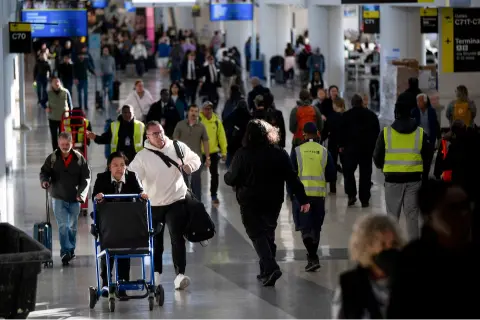News
International Travel Sees Strong Recovery Post-Pandemic
The global travel industry is making a powerful comeback as international tourism numbers surge in 2025. With relaxed travel rules, improved safety measures, and renewed consumer confidence, airlines, hotels, and tourism-dependent economies are seeing remarkable growth after years of pandemic-related slowdowns.

The international travel sector is starting to recover again, and this is one of its best recoveries since the COVID-19 pandemic stopped people from moving across the world and going on vacation. People are once again packing their bags, getting on aircraft, and visiting places all over the world after years of restrictions, lockdowns, and uncertainty. According to experts in the field, the number of international tourists coming to the US in 2025 is almost back to where it was before the pandemic, and some areas have even broken prior records. Airlines are getting more bookings on both long-haul and short-haul routes, and they are adding new flight routes to fulfill the demand. Passengers are once again filling up major international airports that used to be strangely silent. Travelers are finding it simpler than ever to go to locations they had to put off because of lower ticket prices, more flying alternatives, and better customer incentives. The extensive use of digital travel technology is one of the main reasons for this resurgence. Modern technologies have made trips safer, smoother, and more efficient. For example, contactless check-ins, health verification applications, and AI-powered booking systems. Also, a lot of governments have made their visa rules easier and started programs that are good for tourists to get more people to come to their countries. Hotel occupancy rates have gone up a lot in popular places including Europe, Southeast Asia, the Middle East, and the Caribbean. Resorts and international tour operators are saying that they are fully booked months in advance, especially during the summer and holiday seasons. This need has grown even further because of cultural festivals, business expos, worldwide athletic events, and international conferences, which attract both leisure and business tourists. The pandemic had a big effect on local businesses, especially those that depend on tourists. Now, though, things are starting to get better. Restaurants, local transportation services, tour guides, souvenir shops, and places to have fun are all getting a steady stream of tourists again. Millions of jobs that were lost or uncertain are now coming back, which is making communities more stable. But professionals in the field also stress how important it is to have sustainable tourism in this time of expansion. To safeguard natural areas and historical sites, many places are focused on eco-friendly travel, lowering carbon footprints, and carefully managing people. Travelers are becoming more aware of their effect on the environment and are preferring greener hotels and tour companies that operate in a responsible way. Even if there are often political tensions and economic uncertainty, people are nonetheless really excited about traveling abroad. The desire to reconnect with the globe, learn about new cultures, and see relatives and friends across boundaries again is what is driving this comeback. It's evident that travel is not only recovering, but also entering a more dynamic and resilient phase than ever before as the global tourist industry continues to change and grow.
PUBLISHED: November 24, 2025

Jeffrey E. Byrd connects the dots that most people don't even see on the same map. As the founder of Financial-Journal, his reporting focuses on the powerful currents of technology and geopolitics that are quietly reshaping global systems, influence, and power structures.
His work follows the hidden pipelines—where data, defense, finance, and emerging technology intersect. He highlights the players who move behind the curtain: governments, intelligence networks, private security alliances, and digital industries shaping tomorrow's geopolitical terrain.
Jeffrey’s mission is to give readers clarity in a world where complexity is used as strategy.
Read More




